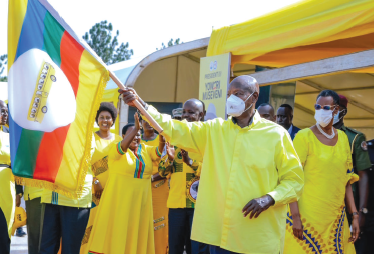President Museveni introduces the ABCDE Framework.
At the launch of the National Resistance Movement (NRM) manifesto for 2026-2031, President Yoweri Museveni presented a comprehensive vision for Uganda’s transformation under the theme: “Protecting the gains and ensuring a qualitative leap to high middle income status.”
The ABCDE Approach: A Framework for National Development
President Museveni introduced an innovative ABCDE framework to simplify complex development issues for citizens:
A – The Seven Foundational Gains
The President outlined seven critical achievements that form the foundation of Uganda’s progress:
1. Peace and Security
The NRM has delivered sustained peace to Uganda, with a strong army ensuring no external threats. However, the President emphasized the need for stronger action against internal crime, particularly theft affecting rural development programs like PDM (Parish Development Model).
2. Development of Infrastructure
This encompasses both social infrastructure (schools and health centers) and economic infrastructure (roads, railways, and airways), all detailed comprehensively in the manifesto.
3. Wealth Creation
Drawing from his experience in the cattle corridor since the 1960s, Museveni highlighted transformative wealth creation. He showcased examples of farmers earning over 900 liters of milk daily (approximately 21 million shillings monthly) and entrepreneurs like Joseph Jala, a former taxi driver now earning over 1 billion shillings annually from dairy and poultry on just 2.5 acres.
4. Jobs Creation
The President challenged conventional thinking about employment, demonstrating that wealth creation naturally generates jobs. New factories now employ 1.2 million Ugandans, compared to 480,000 in the entire public service. Young MP Fred Kayondo Bamukama employs 26 people on his 4-acre model farm, while farmer Nyakana employs 15 people on just 1.25 acres. The President calculated that if 7 million acres were used similarly, Uganda could create 105 million jobs.
5. Service Delivery
Covering healthcare, security, crime prevention, education, and transport systems.
6. Market Access
The President stressed the critical importance of East African integration for market access. Uganda’s milk production (5.3 billion liters) far exceeds internal consumption (800 million liters), making regional markets essential. Similarly, sugar production (700,000 tons) doubles domestic demand (300,000 tons). “Pan-Africanism is not theory, it is survival,” he declared.
7. Strategic Security
Emphasizing the need for a strong army and economy through East African integration and the proposed East African Federation to protect Africa’s future.
B – The Five Phases of Economic Transformation
The manifesto traces Uganda’s economic journey through five distinct phases:
- Minimum Economic Recovery: Restoring basic products like sugar and soap
- Ending Shortages: Ensuring consistent product availability
- Expanding Production: Increasing output of coffee, tea, bananas, and sugar cane
- Diversification: Growing exports to $13 billion through varied products
- Knowledge Economy: Developing indigenous innovation like Kiira Motors (with $120 million government investment) and locally-discovered medicines for cancer, diabetes, and malaria
C – Seven Mass Issues Affecting Citizens
The President identified critical challenges requiring immediate leadership attention:
- Poverty and Jobs: Using PDM to lift villages out of poverty
- Health: Particularly combating theft of drugs
- Crime: Addressing police and judiciary corruption
- Free Education: Showcasing Presidential Skilling Hubs where dropouts receive free 6-month training
- Roads: Addressing poor maintenance of some tarmac roads and murram roads
- Water for Drinking: Ensuring universal access
- Land Grabbing: Protecting citizens’ land rights
D – Irrigation: The Game Changer
The manifesto emphasizes irrigation as crucial for agricultural transformation. Dr. Manga’s model plantation demonstrates the potential, producing 53 tons of bananas per hectare compared to 5 tons by neighboring farmers without irrigation—a tenfold increase through irrigation and fertilizers.
E – Youth and Ideology
President Museveni addressed young people directly, sharing his own photograph from 1968 at age 23, when he was supporting liberation movements across Africa. He stressed that while being young is biology, having the right ideology is essential. The President urged youth to balance pleasure with productive work and wealth creation, warning against influences that promote only entertainment without purpose.
Real Stories of Transformation
The manifesto launch featured powerful testimonies from ordinary Ugandans transformed by government programs:
- Rashida: Started with 1 million shillings from PDM, now thriving with goats, bananas, and coffee
- A 64-year-old woman: Never owned anything in her life until receiving PDM support
- Apio from Lira: Married for 20 years, never handled 1 million shillings, used PDM funds to rent 3 acres, planted maize, and bought sheep
The Vision: From $66 Billion to $500 Billion
President Museveni projected Uganda’s economy will grow from the current $66 billion to $500 billion in the coming years through value addition, diversification, and the knowledge economy.
The manifesto calls for private sector participation in government-funded innovations, inviting Ugandans to purchase shares in projects like Kiira Motors (requiring additional $143 million to produce 10,000 vehicles annually) rather than allowing foreign takeovers.
Conclusion
The NRM manifesto 2026-2031 presents a clear roadmap focused on wealth creation in homes, job generation through private enterprise, regional integration for markets, and technological innovation. As President Museveni emphasized, “Political disagreement is caused by wrong assumptions and lack of information.” The ABCDE framework aims to provide that information, empowering every Ugandan to understand and participate in the nation’s transformation journey.
The message is clear: prosperity begins at home, with each citizen becoming a wealth creator, and collectively building a stronger, self-reliant Uganda within a united East Africa.

